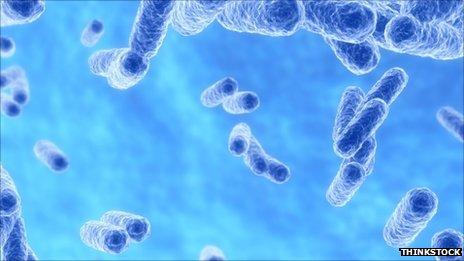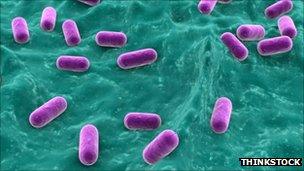Viewpoint: How do our bacteria help us?
- Published
- comments

The bacteria that live in and on us might be responsible for whether we are healthy or unhealthy, and even whether we are fat or thin, writes Ed Yong.
I was born just under 30 years ago. That moment, just before I emerged into the world, was the last time in my life that I would be completely sterile.
Inside the womb, it was just me and mum - a universe of two. But outside, there was a world of bacteria and other microbes, and as soon I entered that world, they became part of me. They colonised my skin. They set up shop in my guts. And these passengers are an essential part of my life.
These hitchhikers, and the genes they carry, are known as the microbiome. We all have them, and they are legion.
There are 100 trillion of them - more than the number of people who have ever lived. Walt Whitman was right when he said: "I am large - I contain multitudes."
Their cells outnumber mine by 10 to one. Their genes outnumber mine by 100 to one. To the nearest approximation, I am microbes.
So who am I? Ed Yong, a human defined by my body and my genome? Or am I a vehicle for bacteria? Am I one individual or an entire universe?
I think it is the latter. These bacteria are not just passive passengers - they affect my life, my health, even my mind. They are like a hidden organ, as essential to me as my intestines or my stomach, but rather than a single mass, this is an organ made of millions of swarming cells.
It is also an organ with many jobs. The bacteria allow me to harvest energy from my food, by breaking down substances that I otherwise could not. They manufacture nutrients that I cannot make myself. They suppress the growth of harmful bacteria that would otherwise make me ill. They educate my immune system, teaching it to treat them as me and not attack them.
To all intents and purposes, my microbiome is me. They are my partners in life. My story is theirs and to understand me, you need to understand them.
My microbiome consists of thousands of species, and they come in many different communities. Yet my microbiome is distinct from yours. There is some overlap, but no two people have quite the same collection. Think about different cities like London and Tokyo. They contain residents of different cultures, occupations and backgrounds, all mingled together in different ways to produce communities with different characters.
And that is what our microbiomes are like - their membership is influenced by all the events of our lives, right from our first day. I was born naturally, so my first bacteria come from my mum.
It amuses me to think that mum's first birthday present to me was a slathering of vaginal microbes. Not quite the Xbox I had in mind, but unquestionably more useful. If I was born via C-section, I would have ended up with a different set of colonisers, from my mum's skin and from the hospital environment.

Our cells are outnumbered by those of our bacteria
This is a big moment, because these pioneers dictated which species arrive later. The ones I got from Mum wielded lots of genes for breaking down milk proteins - clearly, that is a useful ability to have if you are eating nothing but milk for many months.
Breast milk does not just feed baby. It contains special sugar molecules that nourish baby's first bacteria. These molecules may even have evolved as part of breast milk, to selectively feed the right bacteria in a baby's bowels.
When I moved on to solids, my menu became more diverse, and so did my microbiome. It started to include many more species. That is because gut bacteria help to break down our food and each type uses its own cutlery set - the genetic equivalent of steak knives or soup spoons. So gut bacteria are our partners in digestion.
However, because our food today is largely uncontaminated and heavily processed, we risk having a more simplified microbiome. Eating too much food has the same effect. When we flood our guts with calories, as we often do in developed countries, some species of bacteria bloom at the expense of others. This is why obese people have a less diverse microbiome than lean people.
Antibiotics could do the same thing. I received dozens of courses of antibiotics as a child, many of which were for viral infections like colds, which antibiotics do nothing for. Antibiotics kill bacteria, the ones we want as well as those we do not. These grow back, but there is some evidence that they never fully recover.
So in many ways, because of the events in my life, Planet Ed is a less diverse place than it might have been a century ago. The various cities on my body are becoming a bit gentrified. And that might be a problem.
A diverse microbiome is not just about digesting food. It influences my immune system. It crowds out harmful bacteria. It could influence our risk of bowel diseases, allergies, asthma, obesity, diabetes, and infections.
It is important to understand this. I said earlier about my bacteria that to understand me, you need to understand them. Perhaps in the future, we will be able to solve certain medical problems by influencing our hidden legions. That is already starting to happen.
An American doctor, Alexander Khoruts, has treated people with crippling gut infections by - and brace yourselves if you are a bit squeamish - basically giving people poo transplants.
He has taken the gut bacteria of a healthy person and put them inside a sick person. No-one quite knows why it works, but it seems to. This is really early science, but it heralds a future where we may be able to more deliberately manipulate our gut passengers to improve our health. If I go to a doctor, maybe she will check my gut type as well as my blood type.
It is also important to understand that the microbiome is not a group of tenants, who I happen to accommodate. They are not pets. These bacteria have a surprising and perhaps unsettling degree of control over my fate.
If you take sterile mice and give them the microbiome of fat mice, they too become fat. Why? Because these bacteria were extracting more energy from the animals' food, and manipulating the animals' biochemistry so that it stored fat rather than burning it.
The microbiome could also affect our brain. We know that sterile mice, which do not have any microbiome at all, behave differently from normal ones. They are more active, less anxious and less risk-averse.
And you can change all of that if you transplant a microbiome into them at an early age. One group of scientists even managed to change the behaviour of normal mice by feeding them with one specific species of bacterium - it changed the levels of signalling chemicals in their brains, and reduced behaviours that are analogous to stress, anxiety or depression.
No-one really knows how this works in mice, let alone whether it applies to humans. But it does seem that the microbiome has some sort of impact on our behaviour, even if we do not quite know the details yet.
Our knowledge about the microbiome is still in its infancy. Scientists are discovering more and more all the time.
But for the moment, it is clear that I at least would have a diminished understanding of my own life if I failed to consider the teeming millions that share it with me. My microbiome does not just live inside me - it is me.
In many ways, I am like a superorganism - an alliance between the genes of several different species, only one of which is human.
This is an edited version of Ed Yong's Four Thought broadcast.